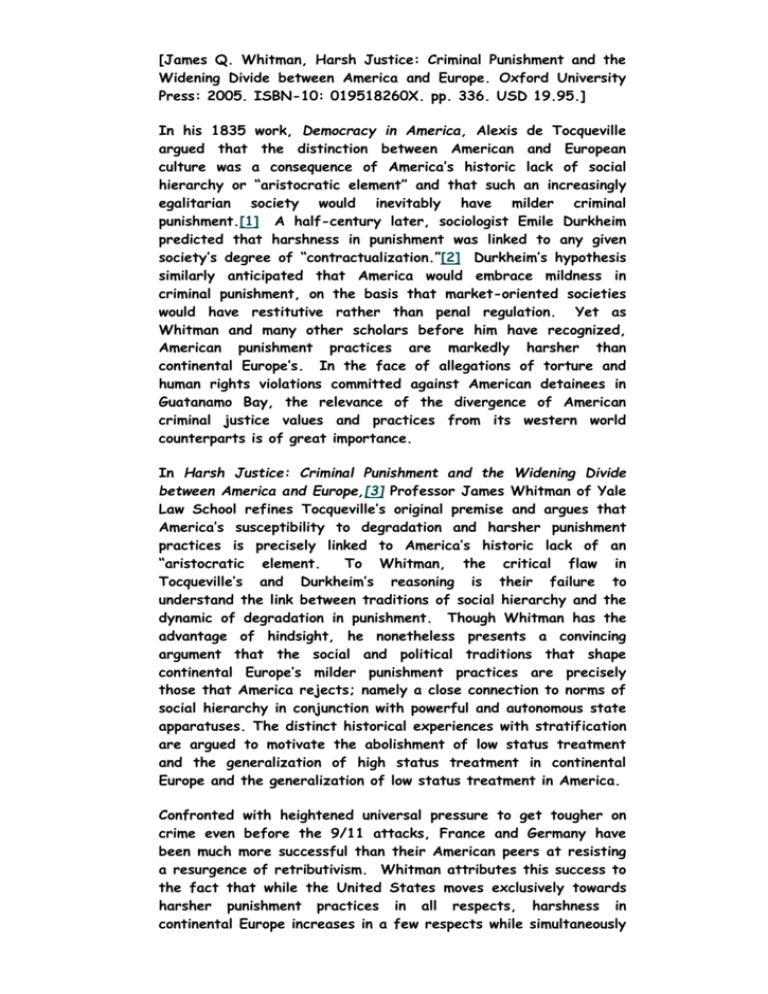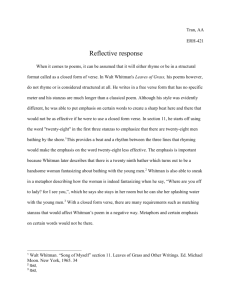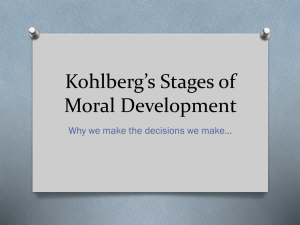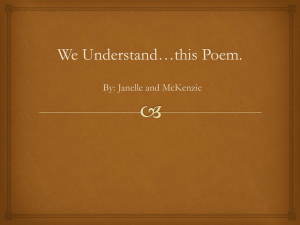German Law and Punishment
advertisement

[James Q. Whitman, Harsh Justice: Criminal Punishment and the Widening Divide between America and Europe. Oxford University Press: 2005. ISBN-10: 019518260X. pp. 336. USD 19.95.] In his 1835 work, Democracy in America, Alexis de Tocqueville argued that the distinction between American and European culture was a consequence of America’s historic lack of social hierarchy or “aristocratic element” and that such an increasingly egalitarian society would inevitably have milder criminal punishment.[1] A half-century later, sociologist Emile Durkheim predicted that harshness in punishment was linked to any given society’s degree of “contractualization.”[2] Durkheim’s hypothesis similarly anticipated that America would embrace mildness in criminal punishment, on the basis that market-oriented societies would have restitutive rather than penal regulation. Yet as Whitman and many other scholars before him have recognized, American punishment practices are markedly harsher than continental Europe’s. In the face of allegations of torture and human rights violations committed against American detainees in Guatanamo Bay, the relevance of the divergence of American criminal justice values and practices from its western world counterparts is of great importance. In Harsh Justice: Criminal Punishment and the Widening Divide between America and Europe,[3] Professor James Whitman of Yale Law School refines Tocqueville’s original premise and argues that America’s susceptibility to degradation and harsher punishment practices is precisely linked to America’s historic lack of an “aristocratic element. To Whitman, the critical flaw in Tocqueville’s and Durkheim’s reasoning is their failure to understand the link between traditions of social hierarchy and the dynamic of degradation in punishment. Though Whitman has the advantage of hindsight, he nonetheless presents a convincing argument that the social and political traditions that shape continental Europe’s milder punishment practices are precisely those that America rejects; namely a close connection to norms of social hierarchy in conjunction with powerful and autonomous state apparatuses. The distinct historical experiences with stratification are argued to motivate the abolishment of low status treatment and the generalization of high status treatment in continental Europe and the generalization of low status treatment in America. Confronted with heightened universal pressure to get tougher on crime even before the 9/11 attacks, France and Germany have been much more successful than their American peers at resisting a resurgence of retributivism. Whitman attributes this success to the fact that while the United States moves exclusively towards harsher punishment practices in all respects, harshness in continental Europe increases in a few respects while simultaneously investing in multiple forms of mildness in a variety of respects. For instance, while neither the United States nor France and Germany mandate comfortable prisons, France and Germany do mandate circumstances that minimize the degree to which inmates feel assigned to an inferior subclass of humans. Whitman characterizes this continental pursuit of dignity as a revealing goal since it aims to avoid the status degradation that is the primary feature in American criminal justice culture. To Whitman, the motivating force keeping dignity and grace at the forefront of continental criminal justice is their history of social hierarchy. The corresponding lack thereof in America is responsible for weakening their collective memory of status degradation and accordingly diminishing American sensitivity towards degrading punishment practices. Contrary to the prevalent view that dignity in Europe emerged as a product of the reaction against fascism, Whitman argues that dignity in Europe has a longer history that began in the 18th century. With the assistance of an extensive comparative exercise examining the development of criminal punishment in continental Europe and America from the 17th century to the present, Whitman illustrates how the hierarchal class system that dominated continental Europe surfaced in their punishment practices by establishing a tradition of less degrading “high status” punishments distinct from low-status punishments. The strive towards dignity corresponded with the “leveling up egalitarianism” that began in France and Germany with the generalization of beheading for all offenders sentenced to death irrespective of class. As far as death penalties were concerned, beheading was traditionally considered the noblest death and was reserved for the elite members of society whereas the most shameful form of death, hanging, was traditionally reserved for low-status persons. The history of continental justice is characterized by a movement towards extending the usage of high-status punishments to a wider array of offenders that were eventually applied to all offenders irrespective of class. In Whitman’s opinion, “levelling up” did not occur in America because status differentiation in punishment was relatively absent in 18th century America. Americans preferred to mix their inmates together indiscriminately in their prisons and their sentencing practices were largely status-blind. The status differentiations in society that were so fundamental to continental Europe mattered less in America. To Whitman, this relative indifference to hierarchy made it impossible for the colonies to achieve the pattern of reform that emerged in France, since there was no special class of offenders and treatment to aspire to. In conjunction with the role of social hierarchy, Whitman argues that the power and autonomy of the state has a great influence in what he depicts as the relative mildness of criminal justice in France and Germany. Whitman examines the past and present tendency in America for citizens to seemingly instinctively rebel against state power, which he argues inhibits the merciful treatment of offenders. He believes that the due-process protections embedded into the U.S. legal system intended to create equity have the undesirable effect of preventing the state from delivering discretionary, merciful punishment. For instance, Whitman points to the ability of continental state power to treat some offences as merely forbidden rather than evil, whereas the American “anti-statist” tradition resists any state effort to forbid an activity on any basis other than wickedness. The overarching distinction that develops is that while continental societies have always operated on the assumption that hierarchy is natural and are thereby wary of the ever-present danger of degradation, American society operates from the opposing assumption that there is nothing natural about hierarchy and has engaged in an opposition to authority. Whitman is careful to disclaim any inference of inevitability in his argument and clearly states that not all countries with sharply defined status hierarchies inevitably evolve into countries with milder punishment practices. Instead, he suggests that traditions of status and state power are always at stake in criminal punishment. While Whitman limits his discussion to the American and continental Europe experience, his explanations for the distinctions between criminal justice systems cannot easily be applied in the Canadian context. The Canadian experience does not diminish the plausibility of his argument that traditions of state and power are always at stake in criminal punishment, but rather the Canadian experience exemplifies the necessity of race and violence in any attempt to explain the disparities between criminal justice systems. Canada, similar to America, did not have an established class regime comparable to France or Germany. Canada’s relatively late date of confederation limited Canada’s own experience with social hierarchy in both duration and intensity. Based on Whitman’s philosophy, Canada’s relatively weak history with social hierarchy and skepticism of state authority would predict criminal justice practices more akin to the Americans than their European peers. However, Canadian punishment practices are notably milder than American practices. The lengths of prison sentences are shorter in duration, incarceration is used less frequently, and prison conditions are arguably superior to their American neighbours. The incarceration rate in the United State is first in the world, at a rate 738 per 100,000 residents, whereas the rate in Canada is 107 per 100,000.[4] The current incarceration rate of 738 per 100,000 residents places the United States first in the world in this regard. The inconsistencies that arise in the application of Whitman’s explanation for the disconnect in criminal justice systemscould be remedied by incorporating the impact of violence and race. Whitman asks the reader to accept his theories in a context absent of factors such as violence, race, and religion by explicitly excluding these factors from his analysis. Whitman fails to give appropriate credence to the significant impact racism and slavery has had on the way in which American culture has developed. The ease with which Whitman separates racism and slavery from his analysis of criminal punishment suggests that he believes the matters exist in watertight compartments and can be divorced from a logical discussion of the American penal justice system. However, the reality of criminal justice comparative study indicates just the contrary. African Americans are incarcerated at a rate of more than six times the rate of white males, and Hispanics more than double the rate.[5] To put the numbers in perspective historically, the 910,000 African Americans today are more than nine times the number of 98,000 in 1954, the year of the Brown v. Board of Education decision.[6] All factors contribute in tandem to the creation and evolution of any given society’s criminal justice system. In Harsh Justice: Criminal Punishment and the Widening Divide between America and Europe, Whitman provides a thorough and compelling argument that will force the reader to confront the important role commonly underestimated factors of social hierarchy and state authority play in the creation of a society’s criminal justice system. Any future attempt to analyze distinctions in criminal justice systems should not proceed without reference to Whitman’s persuasive and imaginative argument in favour of considerations of social hierarchy and state autonomy. However, future authors should be wary of attempting to isolate criminal justice issues to the point where they cannot be easily reconciled with the context from which they derive. An accurate depiction of the distinctions in criminal justice systems can only be obtained through an analysis, which considers all relevant factors. www.germanlaw.com tags:laws, ways of punishment, germany, america








